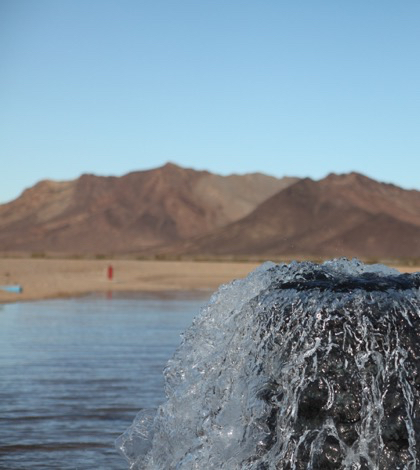A strategic alliance between water resource development company Cadiz Inc., water treatment company ATEC Systems Associates and engineering firm CH2M will bring new and innovative water treatment technology to Southern California for the treatment of Chromium-6 and arsenic in groundwater supplies.
The State of California passed new standards in 2014 limiting Chromium-6 to 10 parts per billion (ppb) in drinking water supplies. The federal standard remains at 100 ppb. Chromium-6 occurs naturally in groundwater basins throughout California, including in the Cadiz Water Project basin, where it occurs at levels just above the new California standard. Chromium is a common metal that enters groundwater when sediment in rock formations dissolves.
According to the California State Water Resources Control Board’s Division of Water Quality, more than 3,300 sources of drinking water tested statewide from 1997 to 2014 had measured levels of Chromium-6. Approximately 12 percent of those sources measured above the new state standard. The California counties with the greatest number of public water wells containing CR-6 include Los Angeles, Yolo, Riverside and San Bernardino. Approximately one-third of the wells in Riverside County’s Coachella Valley, home to an extensive natural groundwater aquifer, exceed the state standard and will require treatment.
“The prevailing view within the water community is that treatment of CR-6 is both intensive and expensive. We decided to make an investment in more innovative technology and feel fortunate to have been connected with ATEC. Their technology will provide dramatic benefits at the Cadiz Water Project area and can help many other water retail agencies that are attempting to cope with still relatively new CR-6 treatment standards,” said Scott Slater, CEO of Cadiz, Inc.
The Cadiz Water Project plan would conserve groundwater presently lost to evaporation at an underground aquifer in eastern San Bernardino County and deliver that new supply to participating water agencies throughout Southern California via the Metropolitan Water District’s Colorado River Aqueduct. In order to meet the new Chromium-6 standard prior to delivering its new water supply into the Colorado River Aqueduct, Cadiz engaged ATEC to conduct pilot tests at the Cadiz Water Project area. In pilot tests, ATEC’s highly efficient treatment reduced both Chromium-6 and arsenic to nearly undetectable levels.
ATEC’s innovative technology is applicable not only to the Cadiz Water Project, but also many similar groundwater basins in California and elsewhere. Through the partnership, Cadiz, ATEC and CH2M will work to present the technology to other water providers that must comply with the new standard and seek to do so in an effective and cost-efficient manner.
“ATEC is excited about the opportunity to provide treatment for the Cadiz Water Project, which will meet the water supply needs of thousands of California families, and we are delighted to help deliver an excellent water product through the use of our very effective technology,” said Bill Ketchum, CEO of ATEC.
The ATEC treatment system is designed around the Reduction-Coagulation-Filtration (RCF) process for CR-6, which is listed as a best available treatment for chromium removal by the California State Water Resources Control Board’s Division of Drinking Water. This treatment strategy is cost effective and can be accommodated within the previous capital and operations maintenance cost estimates for the Cadiz Water Project.
The Cadiz Water Project is in its 7th year of development and will initially provide a new annual supply of reliable, quality water to over 100,000 California households, 20 percent of which is guaranteed to San Bernardino County. The first phase of the Cadiz Water Project includes the construction of a well field and a 43 mile pipeline to connect the Project area’s underground aquifer, which contains up to 34 million acre feet of water, to the Colorado River Aqueduct.
Construction of the $250 million dollar project is slated to begin in 2016, which includes the new water treatment facilities.
 California Water News Daily Your Source For Water News in California
California Water News Daily Your Source For Water News in California


